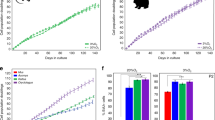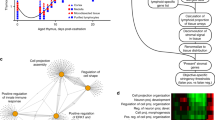Abstract
CORTISONE1 and hydrocortisone2 can prolong the lifespan of human embryonic fibroblasts cultivated in vitro and this prolongation is accompanied by a significant increase in the saturation density. The same effect has been observed in cultures of primary human amnion cells3. One of the constant features during senescence in vitro of cells from different species is the progressive decrease of the cell density at which growth practically stops, and it has been suggested4 that the two phenomena, ageing in vitro and decrease of the saturation density, are related.
This is a preview of subscription content, access via your institution
Access options
Subscribe to this journal
Receive 51 print issues and online access
$199.00 per year
only $3.90 per issue
Buy this article
- Purchase on Springer Link
- Instant access to full article PDF
Prices may be subject to local taxes which are calculated during checkout
Similar content being viewed by others
References
Macieira-Coelho, A., Experientia, 22, 390 (1966).
Cristofalo, V. J., in Ageing in Cell and Tissue Culture (edit. by Holeckova, E., and Cristofalo, V. J.), 83 (Plenum Press New York, 1970).
Yuan, G. C., Chang, R. S., Little, J. B., and Cornil, G. J., J. Geront., 22, 174 (1967).
Macieira-Coelho, A., Eur. J. Clin. biol. Res., 17, 925 (1972).
Levine, E. M., Becker, Y., Boone, C. W., and Eagle, H., Proc. natn. Acad. Sci., U.S.A., 53, 350 (1965).
Ward, G. A., and Plagemann, P. G. W., J. cell. comp. Physiol., 73, 213 (1969).
Stanners, C. P., and Becker, J., J. cell. comp. Physiol., 77, 31 (1971).
Becker, H., Stanners, C. P., and Kudlow, J. E., J. cell. comp. Physiol., 77, 43 (1971).
Emerson, C. P., Nature new Biol., 232, 101 (1971).
Hodgson, J. R., and Fisher, H. W., J. Cell Biol., 49, 945 (1971).
Macieira-Coelho, A., Ponten, J., and Philipson, L., Expl Cell Res., 42, 673 (1966).
Feigelson, M., Gross, P. R., and Feigelson, P., Biochim. biophys. Acta, 55, 495 (1962).
Greengard, D., Smith, M. A., and Acs, G., J. biol. Chem., 238, 1548 (1963).
Jerwell, K. F., and Osnes, J. B., Life Sci., 12, 975 (1963).
Brouty-Boyé, D., Macieira-Coelho, A., Fizman, M. Y., and Gresser, I., Int. J. Cancer, 12, 250 (1973).
Orgel, L. E., Proc. natn. Acad. Sci., U.S.A., 49, 517 (1963).
Winckelmans, D., Hill, M., and Errera, M., Biochim. biophys. Acta, 80, 52 (1964).
Author information
Authors and Affiliations
Rights and permissions
About this article
Cite this article
MACIEIRA-COELHO, A., LORIA, E. Stimulation of ribosome synthesis during retarded ageing of human fibroblasts by hydrocortisone. Nature 251, 67–69 (1974). https://doi.org/10.1038/251067a0
Received:
Revised:
Issue Date:
DOI: https://doi.org/10.1038/251067a0
This article is cited by
Comments
By submitting a comment you agree to abide by our Terms and Community Guidelines. If you find something abusive or that does not comply with our terms or guidelines please flag it as inappropriate.



